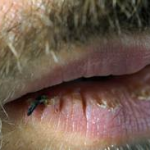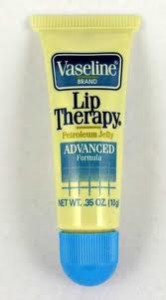Cracked, dry or sore lips are both unsightly and painful. They can be caused by a variety of conditions and can also be symptoms of more serious illnesses. If you suffer from dry or cracked lips, read on to learn how to understand and treat the problem.
Reasons for dry lips
 Identify symptoms of dried lips. It is usually pretty easy to know if your lips are dry or cracked. Some of the symptoms include sensitive or otherwise painful lips, pain when smiling, or frequent lip licking. Your lips could also be peeling, cracked, or bleeding from the sides of the mouth. Open sores or marks are also common.
Identify symptoms of dried lips. It is usually pretty easy to know if your lips are dry or cracked. Some of the symptoms include sensitive or otherwise painful lips, pain when smiling, or frequent lip licking. Your lips could also be peeling, cracked, or bleeding from the sides of the mouth. Open sores or marks are also common.
Know the common causes of cracked lips. There are many causes of cracked and dry lips that you can eliminate when trying to find the cause of your symptom. These include:
- Climate change. Extremes in weather can cause your lips to dry out (cold weather) or become dehydrated (hot weather).
- Sun damage. Just as the rest of your skin can be damaged by the sun, so can your lips. Yes, you can have sunburned lips, and they hurt!
- Wind exposure. Leaving your lips unprotected in a strong wind can cause skin damage.
- Dehydration. Probably the leading cause of most dry or cracked lips is simple dehydration. If the body does not have enough water the extremities, including the lips, will show that lack first.
- Smoking or chewing. Anything you regularly put in contact with your lips can affect their condition.
- Vitamin deficiencies. Certain vitamins are critical to maintaining healthy skin and lips. These include Vitamins A, B, C, B2 (Riboflavin deficiency) and E.
- Allergic reactions. Many cracked and dry lips are the result of negative reactions to cosmetics and skin care products. Overusing commercial products can aggravate the very condition they are supposedly designed to cure.
- Ill-fitting dentures. Badly placed dentures can also cause lip cracks.
- Spicy food. Very hot foods cause dry lips in some people.
- Side effects of medications. Certain medications have dry or cracked lips as a side effect. If your condition coincides with beginning a new medication regimen, consult your doctor about this possibility.
- Skin disorder. Any history of a skin disorder can be related to dry or cracked lips.
Consider more serious conditions. If none of the above seems to be the cause of your painful lips, they could also be a symptom of far more serious problems. Consult a doctor if you suspect that your lip pain originates with a seemingly unrelated ailment. Some possible illnesses could be:
- Diabetes. If you have diabetes or a history of the condition in your family ,this may be a cause of your lip pain.
- Kawasaki Disease. A serious, but rare, blood disorder that is a cause of chronic dry lips.
- Sjogren’s Syndrome. A kind of autoimmune disease which can damage the tear ducts and similar glands is also a common cause of seriously cracked lips.
- Macrocytosis. A blood condition where the average red blood cell size is increased to dangerous levels.
- Sexually transmitted diseases. STD’s, including HIV and other diseases, can be an underlying cause of chronic cracked lips.
Common Methods for Treating Cracked Lips
Drink plenty of fluids. Having 8-10 glasses of water per day is ideal. When your body is dehydrated, it often shows first in your lips.
Apply ointments. Glossy lipstick, unflavored lip balm, petroleum jelly, aloe vera and Vitamin E ointment are all common remedies for soothing cracked lips. Rubbing a cucumber slice on your lips daily for about 10 minutes is also known to be effective, as is applying a drop of sweet almond or olive oil.
Avoid excessive use of commercial skin treatments. These include cosmetics and heavily flavored lip balms. They can dry out your skin.
Consider your diet. Increase the amount of needed vitamins in your diet by eating better or taking supplements like vitamin pills.
Try using fluoride free toothpaste. Some people have an allergy to fluoride that not only affects their lips but can also cause other irritations in the mouth.
Use a humidifier in your home or office. This moistens up air in a room and ultimately moistens up your lips.
Tips
 Protect your lips from the sun as you would the rest of your skin.
Protect your lips from the sun as you would the rest of your skin.- Immediately consult a doctor if you suspect your cracked lips are a symptom of a more serious condition. Your doctor may well refer you to a dermatologist.
- Do not lick your lips. Licking your lips makes them feel better, but when the saliva evaporates, the pain can increase.
- If you have flaky skin on your lips, do not rip the skin off. It will cause soreness and possibly bleeding.
- Do not rub your sore lips with a toothbrush, nail file or anything else of that nature.
Warnings
- Always consult a doctor when diagnosing any medical condition, especially if it does not clear up in a reasonable time under home treatment. In the case of lips, a dentist is probably the most qualified to make any assessments.
- Many chapstick/lip balm products have ingredients in them that make lips feel better, but aggravate the problem. Be sure to check the labels and avoid ingredients that will dry out your lips.
